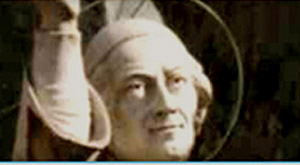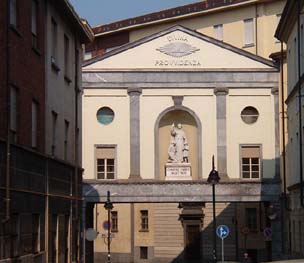 |
The Saint of the Day
St. Joseph Benedict Cottolengo - April 30
Prof. Plinio Corrêa de Oliveira
Biographical selection:
Born in 1786 at Bra, near Turin, Italy, he studied in the Turin seminary and was ordained in 1811. He was parish priest in Bra and Corneliano, and then became canon of the Church of the Trinity in Turin.

A statue of St. Joseph Benedict Cottolengo at Piccola Casa outside Turin
|
One night he was called to the bed of a poor sick woman who died from the lack of proper medical facilities. This incident moved him deeply. In 1827 he opened a small shelter for the Turin sick, which became a hospital. When cholera broke out in 1831, he moved the hospital to the outskirts of the city at Valdocco and called it the Little House of Divine Providence (Piccola Casa). The hospital grew and his activities expanded to assist the aged, deaf, blind, crippled, insane, and wayward girls, the poor and needy of all types. His Piccola Casa became a great medical institution.
He died of typhus at Chieri, Italy, in 1842, and was canonized in 1934.
Comments of Prof. Plinio:
I visited the house of St. Joseph Benedict Cottolengo and saw the room where Our Lady used to appear to him. I also visited the House of Divine Providence, which is really a city of suffering and pain. There, all kinds of sick persons are received and all are well treated. I remember being touched seeing the section for epileptics. The charity of the Church in ministering to those poor persons is particularly expressive of how seriously she considers each one of her children and how far she goes to care for them. St. Joseph Benedict Cottolengo founded many congregations – 14 in all – some to care for the sick in his Piccola Casa, and some contemplative communities to assist the others by their prayer.

An entrance of The House of Divine Providence, with its motto Caritas Christi urget nos
|
Along with his great charity, the main characteristic of St. Cottolengo was his confidence in Divine Providence. He would never go to sleep having money in any drawer of his institution. If he had insomnia, he would think: “Somewhere, someone kept some money.” So, he would wake up and look for the money. When he found it, he would go out into the streets and give it to the first needy person he would find. Then, he would return and sleep well. He did this because Our Lady did not want him to have any money in the house for the next day; if there were, he could not sleep.
Someone once said to me that St. John Bosco told St. Cottolengo: “If Your Reverence does not know who to give the money to, give it to me and I will keep it.” I don’t know whether this is a true anecdote or not. If it is true, it reveals a beautiful antinomy in the ways God oriented two great saints living close to each other, demanding from one a form of perfection that He did not ask of the other. But what is certainly true is that although God asked St. Benedict Cottolengo not to keep any money, the funds were never lacking for him to accomplish the work God asked him to do.
This extreme confidence in Divine Providence is very impressive. Our Lady responded to it with an extreme generosity, giving not only the means to conserve what St. Cottolengo had founded, but to greatly expand his work to the point that it became a great institution.

Piccola Casa, also called the Cottolengo Center after its founder, is a veritable city of charity

|
This extreme confidence inspires us to practice a similar confidence, which sometimes we need to have. In the cause of the Counter-Revolution, sometimes we are asked to have the confidence to do things that appear to be absurd. When Our Lady asks this of us, we should go forward with the certainty that she will help us reach the desired goal. This is the opposite of the present day Naturalism that dictates we must have sufficient funds before doing anything for Our Lady or giving any donation to her cause.
This Naturalism can be reflected in the political sphere. With regard to the great efforts for the Catholic cause, one could be tempted to only risk what is proportional to his natural means, without considering that the supernatural normally allows a man to reach much higher and further than he can naturally grasp.
Obviously, in such enterprises one must have discernment and a certain criteria to know when it is really Our Lady asking us to exercise this kind of extreme confidence that St. Benedict Cottolengo had. I don’t believe, for example, that normally speaking, we should refuse to sleep if we have some money saved. It seems very justifiable and a factor for tranquility to have some means put aside to continue our fight for the Catholic cause. But on those occasions when we discern that Our Lady is demanding this heroic confidence from us, we should practice it following the good example of St. Joseph Benedict Cottolengo.


  | | Prof. Plinio Corrêa de Oliveira | |
The Saint of the Day features highlights from the lives of saints based on comments made by the late Prof. Plinio Corrêa de Oliveira. Following the example of St. John Bosco who used to make similar talks for the boys of his College, each evening it was Prof. Plinio’s custom to make a short commentary on the lives of the next day’s saint in a meeting for youth in order to encourage them in the practice of virtue and love for the Catholic Church. TIA thought that its readers could profit from these valuable commentaries.
The texts of both the biographical data and the comments come from personal notes taken by Atila S. Guimarães from 1964 to 1995. Given the fact that the source is a personal notebook, it is possible that at times the biographic notes transcribed here will not rigorously follow the original text read by Prof. Plinio. The commentaries have also been adapted and translated for TIA’s site.
|
Saint of the Day | Home | Books | CDs | Search | Contact Us | Donate

© 2002- Tradition in Action, Inc. All Rights Reserved
|
 |

|